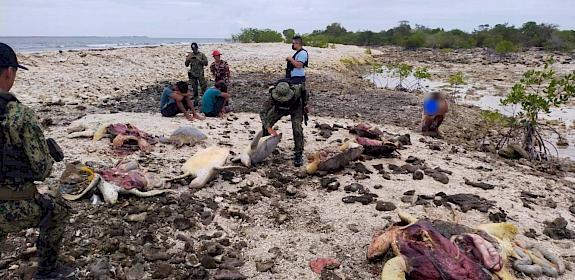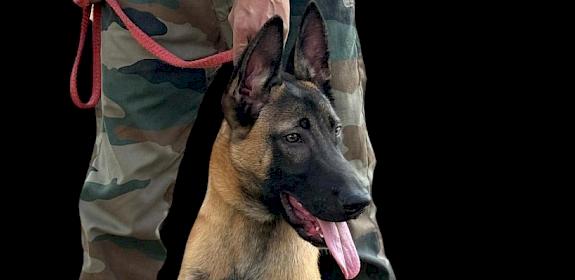Recent seizures highlight trouble for Asia’s tortoises and freshwater turtles
Bangkok, Thailand, 27th March 2014—Hot on the heels of three major tortoise and freshwater turtle seizures in Asia comes another in Bangkok involving close to 300 animals and the arrest of two men suspected of smuggling them.

On 12th March, Royal Thai Customs officers discovered 218 Black Spotted Turtles Geoclemys hamiltonii and 54 Indian Narrow-headed Softshell Turtles Chitra indica in check-in luggage.
The two Indian nationals, who took a flight from Gaya and Varanasi in India to Bangkok, were due to board a flight to Macau when their luggage was checked and the animals found.
Initial investigations show the end destination for the turtles was Hong Kong. The duo has been handed over to Royal Thai Police for further investigations.
“This previously unknown trade route for smuggling turtles from Gaya and Varanasi to Bangkok is often used by religious tourists,” said Dr Shekhar Kumar Niraj, Head of TRAFFIC in India.
The involvement of Thailand, India and Hong Kong in the illegal trade in rare tortoises and freshwater turtles was highlighted earlier this year when over a thousand specimens were confiscated from smugglers in three separate seizures. All three seizures passed through Bangkok, with at least two involving tortoises and freshwater turtles originating from India.
One of these recent seizures, which took place on 31st January, also included a number of Black Spotted Turtles, a species listed in Appendix I of CITES (the Convention on International Trade in Endangered Species of Wild Fauna and Flora), which therefore cannot be traded internationally for commercial purposes.
Another case involved a further 65 Black Spotted Turtles, discovered by Thai Customs and wildlife checkpoint officers at Don Mueang International Airport in unclaimed bags on board a flight from Chennai, India, along with 440 Indian Star Tortoises Geochelone elegans.
Both the Endangered Indian Narrow-Headed Softshell Turtle and the Indian Star Tortoises are listed in Appendix II of CITES, meaning any shipments must be accompanied by appropriate permits. Both species occur in South Asia and are known to be traded for meat and as exotic pets.
India is not the only player in the trade from South Asia in tortoises and freshwater turtles. Seizures of cargoes in Bangkok originating in Bangladesh and Pakistan have also been recorded in the past 12 months.
There are also trade dynamics that point to intra-regional movements of these species. In February 2014, 5000 softshell turtles were seized in West Bengal en route to Bangladesh.
“Co-operation between India and other member countries of the South Asia Wildlife Enforcement Network (SAWEN) is essential to combat the increasingly organised nature of wildlife crime in the region, and connect to destinations in Thailand, Hong Kong and other parts of Asia,” said TRAFFIC’s Dr Niraj.
TRAFFIC’s experience across Asia is being marshalled to support governments – through information exchange, international dialogues, species identification skills, and other capacity building efforts – to take the fight against illegal trade a notch higher.
“Catching the mules of the trade won’t be enough to stop the organized criminal elements that are driving the regions rare tortoises and freshwater turtles to the brink,” said Dr Chris R. Shepherd, Regional Director for TRAFFIC in South-East Asia.
“Seeking out and stopping the big guns that control this trade should be the real focus of enforcement action.”




